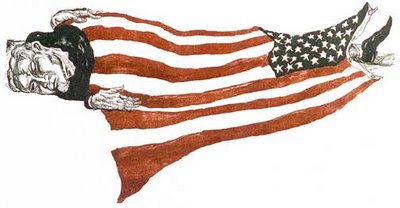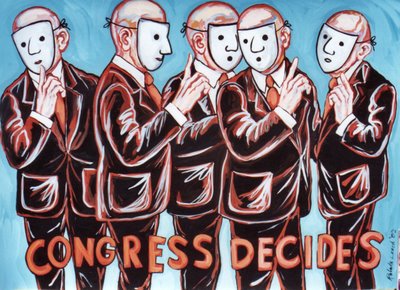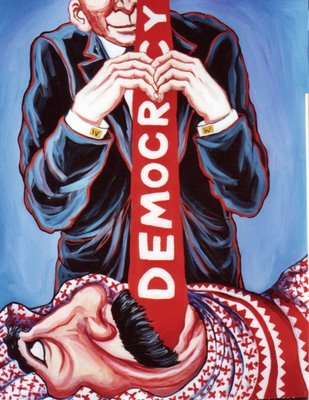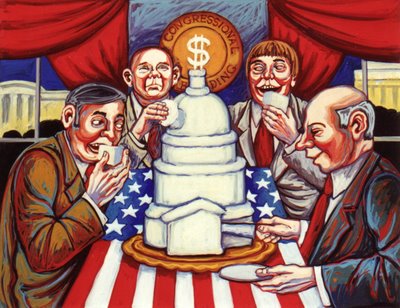Today I'm featuring some excellent text from one of the nation's few progressive Think Tanks, the Rockridge Institute, and exhibiting some more of Art Hazelwood's wonderful prints. The text excerpts are from linguist George Lakoff's new book, Thinking Points: Communicating Our American Values and Vision, A Progressive's Handbook.
You can download the entire first chapter, and more, at their
website. This is a very useful manual for clear thinking and communication that progressives need to learn to use, and propagate. Read it, think on it, share it around your personal community and work it, work it, work it!
For progressives to succeed in taking back this country, we need to stay true to our values and communicate them effectively. To accomplish this mission, we need to be aware of the traps that have often tripped up progressives in the past
Six of the Twelve Traps to Avoid:
1. The Issue Trap
We hear it said all the time: Progressives won't unite behind any set of ideas. We all have different ideas and care about different issues. The truth is that progressives do agree at the level of values and that there is a real basis for progressive unity. Progressive values cut across issues. So do principles and forms of argument. Conservatives argue conservatism, no matter what the issue. Progressives should argue progressivism. We need to get out of issue silos that isolate arguments and keep us from the values and principles that define an overall progressive vision.
 The News Consumer
The News Consumer ©
Art Hazelwood 2001
2. The Poll Trap
Many progressives slavishly follow polls. The job of leaders is to lead, not follow. Besides, contrary to popular belief, polls in themselves do not present accurate empirical evidence. Polls are only as accurate as the framing of their questions, which is often inadequate. Real leaders don't use polls to find out what positions to take; they lead people to new positions.
3. The Laundry List Trap
Progressives tend to believe that people vote on the basis of lists of programs and policies. In fact, people vote based on values, connection, authenticity, trust, and identity.
 It Can't Happen Here
It Can't Happen Here ©
Art Hazelwood 2000
4. The Rationalism Trap
There is a commonplace--and false--theory that reason is completely conscious, literal (applies directly to the objective world), logical, universal, and unemotional. Cognitive science has shown that every one of these assumptions is false. These assumptions lead progressives into other traps: assuming that hard facts will persuade voters, that voters are "rational" and vote in their self-interest and on the issues, and that negating a frame is an effective way to argue against it.
 America: A Prophecy
America: A Prophecy ©
Art Hazelwood 1998
5. The No-Framing-Necessary Trap
Progressives often argue that "truth doesn't need to be framed" and that the "facts speak for themselves." People use frames--deep-seated mental structures about how the world works--to understand facts. Frames are in our brains and define our common sense. It is impossible to think or communicate without activating frames, and so which frame is activated is of crucial importance. Truths need to be framed appropriately to be seen as truths. Facts need a context.
6. The Policies-Are-Values Trap
Progressives regularly mistake policies with values, which are ethical ideas like empathy, responsibility, fairness, freedom, justice, and so on. Policies are not themselves values, though they are, or should be, based on values. Thus, Social Security and universal health insurance are not values; they are policies meant to reflect and codify the values of human dignity, the common good, fairness, and equality.
 America: Safety Net
America: Safety Net ©
Art Hazelwood 2001
Please respect the work of the artists you see here and be sure to credit them when you share their artwork with others. To share your opinion on this or any other post, please click the word "COMMENTS" below.























































